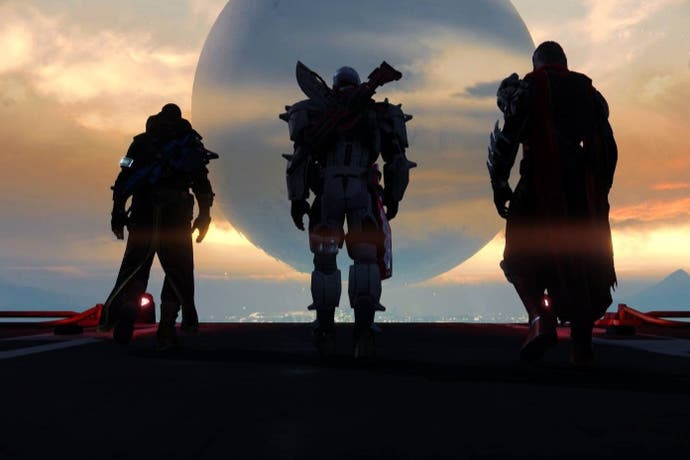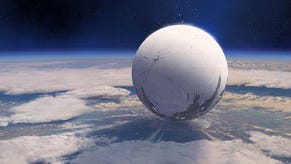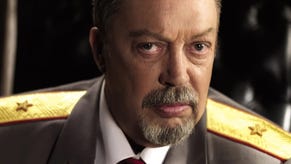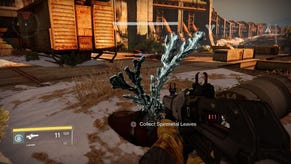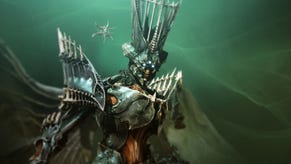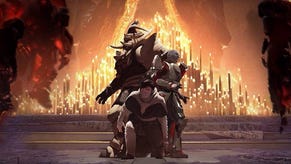Bungie on the Destiny level cap, raids and game size
Post beta, the end - or beginning - is near.
The recent Destiny beta left developer Bungie with mountains of feedback and more hard data than it could possibly hope to digest. But it's trying.
After the 4.8 million players who got stuck in to the online first-person shooter laid down their weapons, Bungie had questions to answer. For the first time Destiny had bared its soul, and we all had our say on what we saw. Like, for example, why limit raids to just six players? And why can they only be played with friends? Oh, and why is the game limited to just one area on each of the four worlds included at launch? And what's up with the level cap? Just how high can you go?
At Gamescom we sat down with director of production Jonty Barnes and lead concept artist Jesse van Dijk to put these questions, and more, to Bungie.
What was the most useful feedback you got from the beta?
Jonty Barnes: Let's start with the most important thing, which is, it was a test. Having all of those players at once, we didn't fall on our face. We were able to scale to the demands on the servers of all of the players. In fact we exceeded some of our targets, which was great. So we're pretty confident going into the launch that we're going to have a game that's going to work for all four consoles on day one.
It was very much a real test. And the next layer to that is about tuning. Better matchmaking, better combination of getting people to meet, better tuning on geographic location within the game. And then from the design side there was a lot we learnt for balancing. The hand cannon wasn't powerful enough in competitive multiplayer, and the Interceptor, we're changing that so there's just one Interceptor on First Light.
Jesse van Dijk: One of the pleasant surprises was the distribution between the player classes was really even.
I was under the impression Warlock was the most popular.
Jesse van Dijk: We get that a lot from people, like, clearly this is the superior class.
Jonty Barnes: I can tell you there's less than two per cent between the lowest and the highest.
The long-term part is, we got to see what gamers liked to participate in. What activities they got a lot of enjoyment from. How long they spent in public events to make sure they were really good. Did six or nine players work best for certain public events, when we collide, when players are getting together and making sure they've got this disruptive but really fun encounter? So a lot of balancing that's going to make the experience on launch much better.
There was a huge amount of value in seeing how much people liked to explore and how we can we make that a better experience. What are we going to do to evolve the explore mode and patrol so beyond 9/9, what will we do to update the world to make them even more fulfilling?
Have you got any ideas?
Jonty Barnes: We've got plenty of ideas! We've got some things like UI readability we've got for day one that's just better. But we do have things we're going to change over time that will make those experiences better. You'll see stuff and you'll go, hey, have you seen what they've done to the explore mode recently? Maybe we should do some of that - it seems a lot better. We're going to try to do that for all of the game and build on the world.
Having gamers participate in the dialogue about what they would like to see, not just our own team and user research group of gamers coming in and out, it certainly makes - it has done historically for Bungie - our games better.
Jesse van Dijk: It's going to be a very organic process. We definitely intended Destiny to be this living and breathing world. It's certainly not the case that we ship the product on the disc and that's it. As soon as it becomes live we're going to interpret the way people play the game and cater towards that by offering new content and literally making sure there's a new thing for you to do every single day.
That sounds like a huge effort for you as developers to create something new every day.
Jonty Barnes: We did that with hoppers in Halo. There's some amount of that. But there are things we've designed we can poke and twist at the players and have a good time with. When you think about the more advanced Guardians and the kinds of activities they're going to be doing, it's going to be very different to the people who are getting up to being more advanced.
We've got these things called Nightfall Strikes and various other things which really change things up.
Nightfall Strikes, eh? What are those?
Jonty Barnes: I'll tell you in four weeks. And the raids is something people haven't played. We put a big investment in this game. We believe we can have people play the cooperative experience time and time again and change it up in the way we have been successful in the past with people playing competitive.
This is a great investment game, with the RPG elements of it. We can see we're driving behaviour for people to be able to play in different activities. It was very much a goal of Jason's [Jones, creative chief] when he started, to have an activity for every mood of player. So we're striving to reach that goal all of the time.
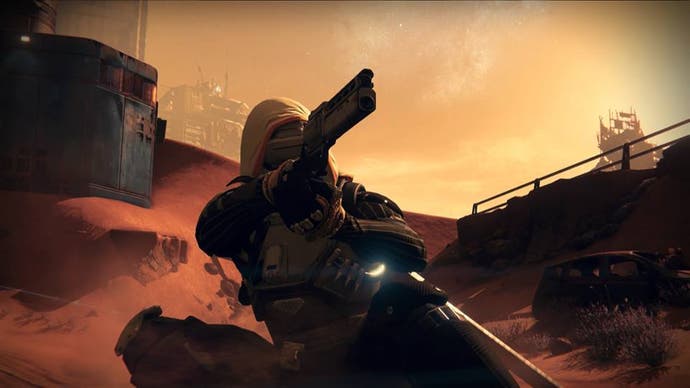
There are four worlds to visit: Earth, the Moon, Mars and Venus. And within each of those just one place to explore. You must have seen the debate about the size and scope of the game on day one. What's your take on that debate?
Jonty Barnes: If I'm honest with you, it blew my mind, because it's the biggest game we've ever made. I don't think people understand the depth and amount of gameplay there is in Destiny. It was a big beta. So the first thing, I was like, well that was a huge beta. I don't understand how people could have that concern when you think about that and all the different planets we're going to open up and the gameplay we've got there.
I'm not worried about it, because I honestly believe Destiny is a huge game. I can tell you that through blood and sweat as well. It's been a huge game and undertaking for us. Compared to anything we've done before, if you're going to do a comparison, you're laughing, honestly.
It was surprising, but part of that is, because we have all these connected spaces - we've got lots of locations but we drive them to be connected so we have all these collisions of people. However you divide something up, you can make a number look big or small. In people's heads they don't really understand what that is.
Jesse van Dijk: People have had a glimpse of the moon. Mars and Venus - people have not seen those at all. But in addition to all of that real estate, what's important to emphasise is as your character progresses through the leveling system and as you acquire more powerful arms and gear, the way you play the game is going to change.
Jonty Barnes: Yeah. You haven't experienced all of earth. If you're a higher-powered Guardian you'll be doing additional experiences on there that are harder that open up combatant behaviours that aren't available at the lower levels.
Jesse van Dijk: That cross-section of the experience is going to be very different from the experience from the beta, which was just the tip of the iceberg. It's not so much just a vertical branching out into more content, but it is also a horizontal one. We're offering you different ways to experience all of this world.
Jonty Barnes: For us in the studio, it was not something we were instantly worried about. The one thing we're not worried about Destiny is, is there enough game there? I can assure you, it's a huge undertaking. It's a huge game. I don't think anyone's got anything to worry about.
Oh, and Mercury. There is a multiplayer map, which is the only time you get to visit Mercury on the launch content of Destiny 1. And it's called The Burning Shrine. It's one of the most beautiful multiplayer maps. It's right by the sun so the skybox is incredible. Also it has changing Vex blocks, so your sightlines can be totally disrupted during competitive multiplayer. It's by far my favourite map, because it's changing reality.
Might we eventually do campaign stuff on Mercury?
Jonty Barnes: Who knows where we're going to go? We've got so much opportunity with the solar system and the ideas we've developed - some of which we've not talked about.
Jesse van Dijk: Destiny has been designed from the ground up with this long-term vision and future expansion in mind.
Jonty Barnes: Some of the spaces we thought we were going to go for the launch of the game, we made better choices. They eclipsed some of the initial plans. So we were agile around that. When we see what people are playing and what they most enjoy, we'll be using that as part of the prioritisation.
I know you have talked about going to Chicago, and some thought we'd get to visit there when the game launches.
Jesse van Dijk: When we started thinking about the IP years ago, we created a singular vision of what the flavour of the world would have to feel like. What is this typical nature of Destiny? What is the type of game we're trying to make? The way we did that was building this huge fiction that came in the form of all of these various places.
Jonty Barnes: We want to tell the story of the world through the destinations as much as possible, rather than blunt dialogue. Old Chicago was a piece of concept art we did actually show. There's still a lot of enthusiasm for that. But whether or not that ever makes it into the Destiny universe is to be determined.
Jesse van Dijk: With so many things like that, the fact it even exists, it's going to inform things that are readily available at launch. The fact the world extends beyond accessible areas informs certain things that are happening within the world. And that's great. A game needs to have that underlying realm of events that happened that inform certain things in the world to provide the player with that layering.
Certain people will not necessarily be all that interested. But for the people who are, they can dig through and go through all of these discoveries, which is actually one of our most important mechanisms for making people curious, by hiding all of these nuggets within the world, that refer to things that happened in the past or in other places.
To come back to your first point about our response to the response of the players in terms of the size of the game, we actually went through a similar process when we were first starting to talk about the game as a whole. We tried our best to clearly communicate what we were trying to do, but we struggled to get that singular vision across in a clear way. But all of a sudden, people got to play the beta, and part of the message clicked. We're confident once people get to experience the game on 9/9, that discussion will go away.
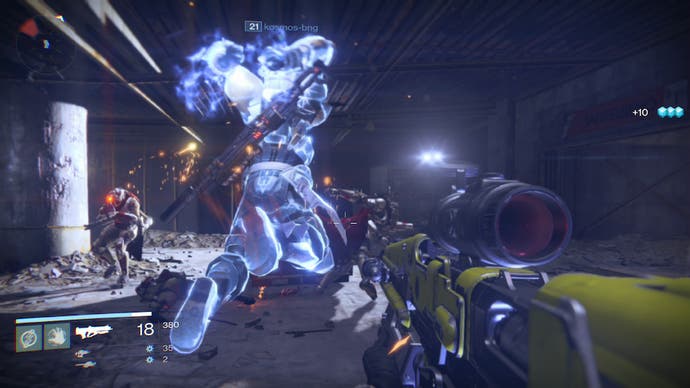
Another discussion revolved around the six-player limit for the raids. Some were hoping for bigger scale raids. Can you explain how you settled on six players?
Jonty Barnes: Let's talk about the three-player fireteam. If you look at social circles and our ability to find players, we found doing four-player co-op in the metrics we had in previous Bungie games, when you look at trying to make sure there's always a great encounter for people to have, three was a sweeter spot than four. But also, I can get one or two friends to organise with me in an evening. But as soon as I try and get another person, there's a bigger barrier than you would think. So that was a motivator.
Also, when you think about the dynamic of a triangle, or flank wingmen as you're going through something versus four players, what is that fourth player doing? It's harder for teams to coordinate. When you look at those things combined we fell on fireteams of three.
Then a lot of the conversations became about multiples of fireteams. What is the best way for us to be playing? We've definitely done lots and lots of prototypes with lots of players. We found, once you got beyond a certain number, it wasn't actually as much fun. It really got in the way of the player experience in terms of the ability to coordinate and do things.
So, when you think about raids, it's very much about playing different roles to try to get through. It's very difficult. But if you think about it in terms of two fireteams that are coordinating, the idea of six people coordinating with their different aspects, and the way they're designed - which you'll see later that I won't talk about - all those things combined made six right. Getting a group that's big enough to commit to spending a period of time until they were successful, rather than having somebody jump out and everyone have to struggle to get another player, was actually the sweet spot. It was very much about that three-player dynamic I described and the sweet spot of doing raids with six. More isn't always better.
The other issue is you need to be friends for raids. There's no matchmaking.
Jonty Barnes: We intentionally did that.
Some people are concerned they won't have enough friends to do a raid, and therefore miss out on the content.
Jonty Barnes: We're going to see people self-organise. We're seeing people in the Tower already gathering saying, who's going to commit for a raid?
It is about that commitment part. If you just casually matchmake... you can see people jump out of competitive multiplayer games in matchmaking. In Strikes you can continue with two if somebody jumps out. You can still have that experience and not feel robbed. A raid requires six. If you've got five players in the raid, you're not going to win. You're not going to get through. I can tell you now, it's really tough, and it's intentionally meant to be that way. We've all got roles to play. So it requires a commitment of six people. That was very intentional.
It's about the group dynamic. It's not just about a casual dynamic. It's about an understanding of people committed to playing the roles in raids. And preparing. With raids, you don't just jump into them. You've got to prepare before you go in, and decide, what are you doing? What am I doing? Let's all talk about it in orbit. Okay, what role are you going to play? Well, I'm an x Titan, whatever type of Titan I am, and I'm going to be defensive and hold positions. And, have you played this before? Yeah, I found success when I did it this way.
We don't explain what to do. You've got to work it out. It's very unlike any other activity we've ever done before. It's exciting. People will play it more and get more organised about it. We've seen that in other games where people have created sites of raid finders for MMOs. We may see that.
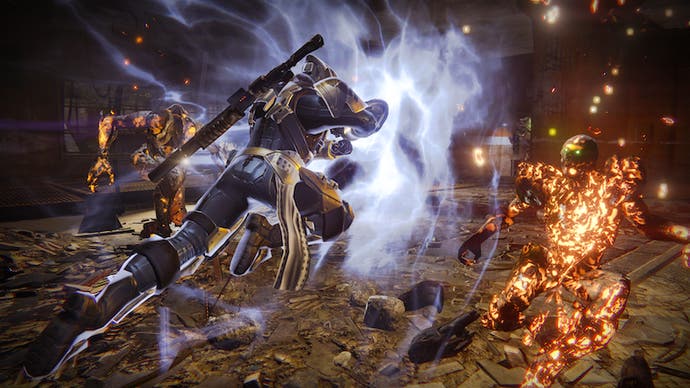
I'd like to talk about the level cap. We know there's a soft level cap of 20, but you can go beyond it by gaining Motes of Light and applying them to your items.
Jonty Barnes: Yeah. You get towards 30 through Light. But it also changes in the kinds of things you get. You go broader when you think about the arsenal you have, or the armour you choose to pick. You get very specialised in terms of the damage types you want, because you're going to need to care a lot more about, have I got a real good thermal weapon for going into this thing that's one of the nightfall things I'm not allowed to talk about.
You'll find you become a more complete Guardian. Rather than this race for vertical power, it becomes breadth as well.
It seems like you can get to level eight pretty quickly.
Jonty Barnes: For the beta.
But 30 is the level cap?
Jonty Barnes: Yeah.
Did you speed progression up for the beta?
Jonty Barnes: There was access to certain objects you got earlier than you would have done, because we wanted to give you exposure to them in the Iron Banner. But things have changed. That's one of the reasons for wipes. There were certain things you shouldn't be getting so early. It's a different world at launch, but not entirely unfamiliar.
Thanks for your time.
